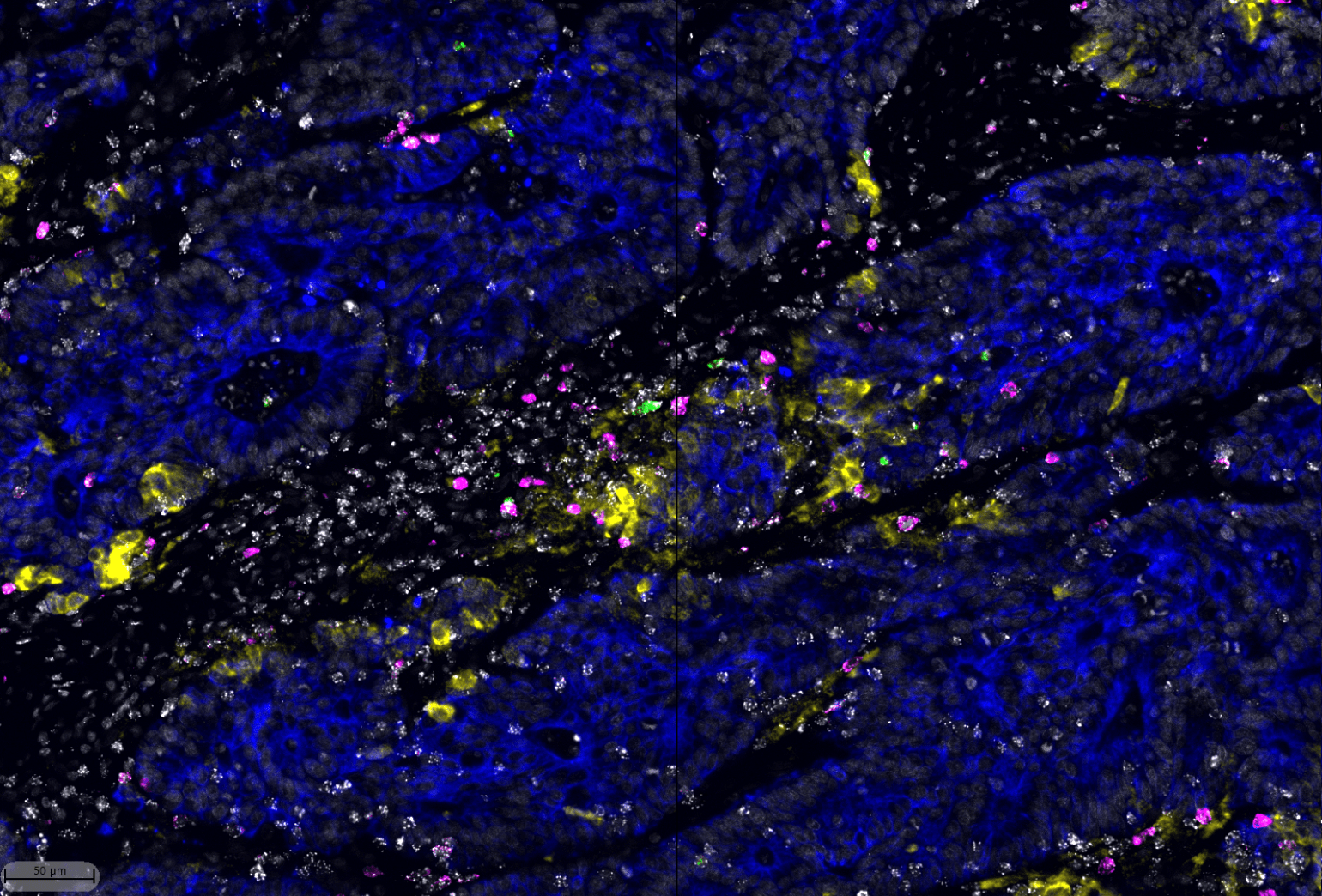Immune Cell Hubs Interact with Malignant Cells in Human Colorectal Cancer
Key findings
- In colorectal cancer and some other cancer types, mismatch repair–deficient (MMRd) tumors exhibit a substantially better response to immunotherapy than mismatch repair–proficient (MMRp) tumors
- This study, conducted to probe the reasons for that difference, involved single-cell RNA sequencing of 371,223 cells from 28 untreated patients with MMRp tumors, 34 with MMRd tumors, and adjacent normal colon tissue
- The predominant difference in immune composition between MMRd and MMRp tumors was in the T-cell compartment, with results suggesting anti-tumor T-cell immunity develops often in MMRd but rarely in MMRp tumors
- Certain transcription programs and cell types were present only in MMRd tumors; furthermore, three immune-related gene expression programs showed greater activity in MMRd than MMRp tumors
- The researchers identified immune "hubs"—interactions of tumor cells with immune cells and gene programs; better understanding of these networks is expected to boost efforts to improve response to immunotherapy in colorectal cancer and other tumor types
In colorectal cancer (CRC), there are striking differences between two immunologically disparate tumor types: mismatch repair–deficient (MMRd) tumors have a high mutational burden and about 50% respond to immune checkpoint inhibitors, whereas mismatch repair–proficient (MMRp) tumors have a low mutational burden and are largely unresponsive to immunotherapy.
Subscribe to the latest updates from Oncology Advances in Motion
Using a combination of single-cell RNA sequencing and imaging, Orit Rozenblatt-Rosen, PhD, and Aviv Regev, PhD, of the Broad Institute of MIT and Harvard, Nir Hacohen, PhD, director of the Center for Cancer Immunotherapy at the Massachusetts General Hospital Cancer Center, and colleagues examined the finest level of tumor spatial organization ever observed, detecting immune "hubs" that may explain why certain patients with CRC are more likely to respond to immunotherapy. The paper was published in Cell.
Immune Cell Compartment
The team analyzed 371,223 cells from 28 untreated patients with MMRp tumors, 34 with MMRd tumors, and adjacent normal colon tissue. The predominant difference in immune composition between MMRd and MMRp tumors was in the T-cell compartment.
For example, CXCL13+ and PDCD1+ γδ-like T cells were enriched in MMRd tumors, whereas IL17+ T cells were enriched in MMRp tumors. It seems that anti-tumor T-cell immunity develops often in MMRd but rarely in MMRp tumors.
Gene Expression Programs
Certain transcription programs and cell types were present only in MMRd tumors. Furthermore, three immune-related gene expression programs showed greater activity in MMRd than MMRp tumors and sometimes greater activity than in normal tissue. These programs in malignant cells may mediate interactions with the immune system.
Immune Hubs

Figure 1
In the subset of mismatch repair-deficient human colorectal tumors, activated and likely tumor-reactive T cells (white, green, and magenta) are organized into "hubs" around malignant cells (blue) expressing chemokines (yellow) that attract T cells and other cells into spatially organized immune cell hubs. Image courtesy of Nir Hacohen, PhD.
The researchers identified immune hubs in tumors in which changes in gene programs within one cell type varied with changes in another cell type. They scrutinized two types of hubs in which programs active in immune cells co-varied with immune-related programs active in malignant cells:
- One of the hubs, detected in both MMRd and MMRp tumors, exhibited an inflammatory interaction network of malignant cells, monocytes, fibroblasts and neutrophils at the luminal margin, particularly at sites with abundant necrosis
- The other was MMRd-specific and was located deep within tumors, comprised of chemokine-expressing malignant and non-malignant cells adjacent to activated T cells
Tumors containing immune hubs may be more likely than others to respond to immunotherapy. Exploring how immune cells change their gene expression patterns and communicate with each other during immunotherapy may improve treatment response in colorectal cancer and other tumor types.
view original journal article Subscription may be required
Learn about the Center for Cancer Immunotherapy at the Mass General Cancer Center
Refer a patient to the Mass General Cancer Center